

The biggest predictor of career success? Not skills or education — but emotional intelligence. What determines the probable future career success of individuals?

Is it intelligence, technical knowledge and skills, their socio-economic background or educational success? Are the forces that make success the same for Generations X and Y as they are for the Baby Boomers? These questions have been researched extensively by recruiters, talent management experts and human behaviour researchers in the past decade. The answers now point to emotional competencies. First, it’s important to note that a distinct North American and particularly American myth has been perpetuated that colours our perspective on career success: The “self-made man” or “anyone can make it to the top” myth. Researchers for the past century have investigated the determinants of career success. A 2006 study by Accenture of 251 executives in six countries concluded that while intelligence is important for career success, it’s a matter of how you are smart. Can you improve your emotional intelligence?
What You Don't Know Will Hurt You: The Top 8 Skills Professionals Need to Master. How to Listen When Your Communication Styles Don’t Match - Mark Goulston. Effective communication: barriers and strategies. Audio version of "Effective communication: Barriers and strategies" tip sheet (MP3) While there are many subtleties to communication between people, some basic skills can help you to be a more effective communicator.

This document will explore barriers to listening, and strategies for effective listening; barriers to accurate perception, and strategies for accurate perception; barriers to effective verbal communication, and strategies for effective verbal communication. Barriers to listening Focusing on a personal agenda. When we spend our listening time formulating our next response, we cannot be fully attentive to what the speaker is saying. Strategies for effective listening Stop. Barriers to accurate perception. Why Listening Is So Much More Than Hearing. 3 Elements of Great Communication - Management Tip of the Day - April 26, 2013. What motivates us at work? 7 fascinating studies that give insights. “When we think about how people work, the naïve intuition we have is that people are like rats in a maze,” says behavioral economist Dan Ariely in today’s talk, given at TEDxRiodelaPlata.
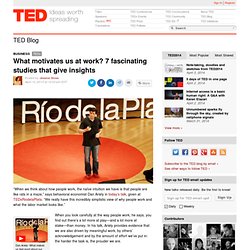
“We really have this incredibly simplistic view of why people work and what the labor market looks like.” Dan Ariely: What makes us feel good about our work? When you look carefully at the way people work, he says, you find out there’s a lot more at play—and a lot more at stake—than money. In his talk, Ariely provides evidence that we are also driven by meaningful work, by others’ acknowledgement and by the amount of effort we’ve put in: the harder the task is, the prouder we are. Improve Your Communication Skills - Online Training from MindTools. Amy Cuddy: Your Body Language Shapes Who You Are. TED and The Huffington Post are excited to bring you TEDWeekends, a curated weekend program that introduces a powerful "idea worth spreading" every Friday, anchored in an exceptional TEDTalk.

This week's TEDTalk is accompanied by an original blog post from the featured speaker, along with new op-eds, thoughts and responses from the HuffPost community. Watch the talk above, read the blog post and tell us your thoughts below. Become part of the conversation! Power. 999: request failed. Don't Delay That Tough Conversation Any Longer - Management Tip of the Day - November 30, 2010.
How to Overcome Communication Fears - JD Schramm. By JD Schramm | 10:37 AM September 30, 2010 [For more, visit the Communication Insight Center.]
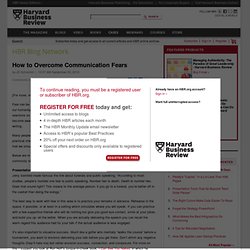
Fear can be a good thing, if it doesn’t paralyze us completely from taking action. Fear reminds us of our humanity, keeps us from stepping in front of moving cars, and can activate “fight or flight” reactions so we are not trapped in threatening situations. As communicators, however, we have to become aware of fears that may prevent us from even trying to connect with others in speech or writing.
Many people quote FDR who said “the only thing we have to fear is fear itself.” Below are my favorite strategies for coping with the fears my students and clients have most commonly shared with me. Presentations Jerry Seinfeld made famous the line about funerals and public speaking: “According to most studies, people’s number one fear is public speaking. Write Emails That People Will Read - Management Tip of the Day - October 09, 2013.
Before You Get Defensive, Take a Breath - Management Tip of the Day - January 31, 2014. Three Ways to Avoid Communication Breakdowns - Management Tip of the Day - April 19, 2011. Know the Impression Your Body Language Makes - Management Tip of the Day - January 02, 2013. Three Elements of Great Communication, According to Aristotle - Scott Edinger. By Scott Edinger | 9:00 AM January 17, 2013 In my nearly 20 years of work in organization development, I’ve never heard anyone say that a leader communicated too much or too well.

On the contrary, the most common improvement suggestion I’ve seen offered up on the thousands of 360 evaluations I’ve reviewed over the years is that it would be better if the subject in question learned to communicate more effectively. The Seven Habits of Highly Effective People. The 7 Habits of Highly Effective People, first published in 1989, is a business and self-help book written by Stephen R.
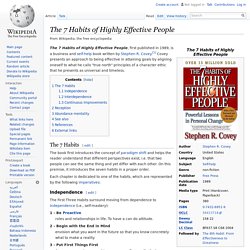
Covey.[1] Covey presents an approach to being effective in attaining goals by aligning oneself to what he calls "true north" principles of a character ethic that he presents as universal and timeless. The 7 Habits[edit] The book first introduces the concept of paradigm shift and helps the reader understand that different perspectives exist, i.e. that two people can see the same thing and yet differ with each other.
Effective Communication. What Google Taught Me About Personal Communication - Stew Friedman. By Stew Friedman | 11:22 PM May 27, 2008.
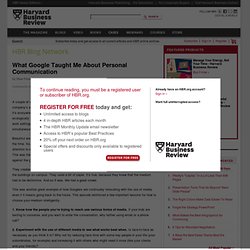
Communications Lessons from the Tillman and Lynch Revelations - Kathy Bloomgarden. By Kathy Bloomgarden | 4:15 PM April 27, 2007 Today’s Conversation Starter comes from Kathy Bloomgarden, CEO of public relations giant Ruder-Finn, and author of Trust: The Secret Weapon of Effective Business Leaders.
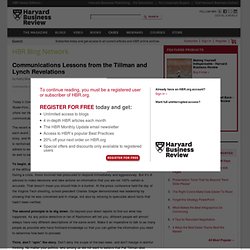
Bloomgarden offers her thoughts on the recent revelations about Pat Tillman and Jessica Lynch from a communications perspective. The recent revelations about Pat Tillman and Jessica Lynch, finally getting at the truth years after each event, is our latest reminder that crises are complex, that it is often difficult to get the straight story, and that the cover-up is almost always worse than the crime. No matter how many times this is reinforced by experience, business and political leaders regularly make things worse by failing to adhere to even the most basic communication principles about what to do in a crisis.
Leaders would do well to keep four lessons in mind: To begin, determine the facts for yourself. 10 Tips on Writing from David Ogilvy. What it Really Takes to Succeed.